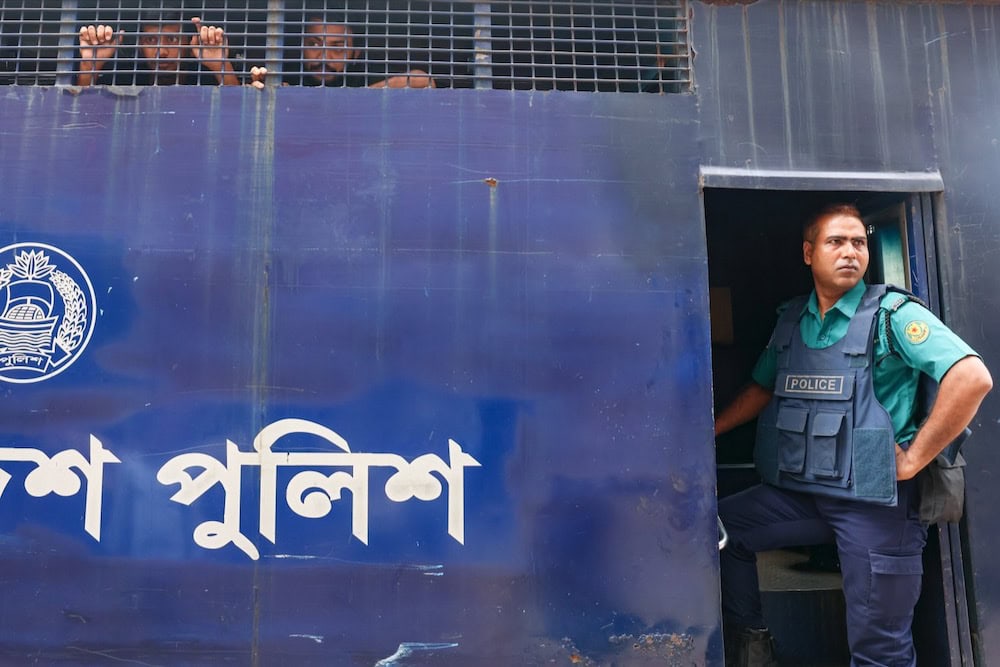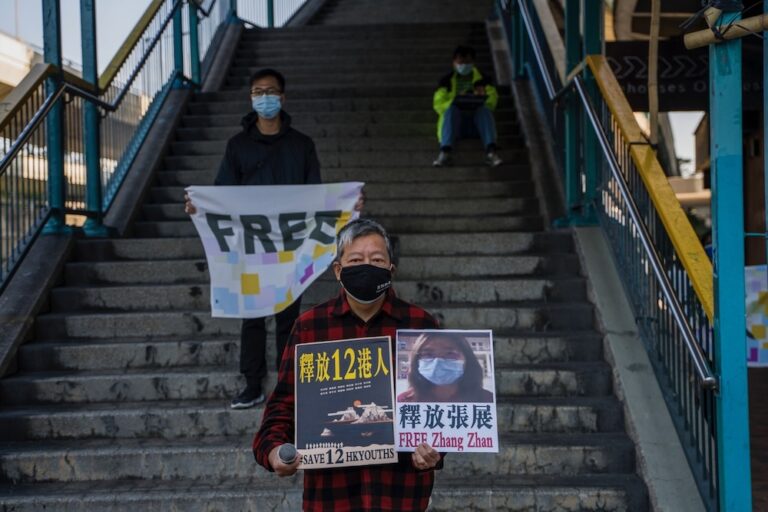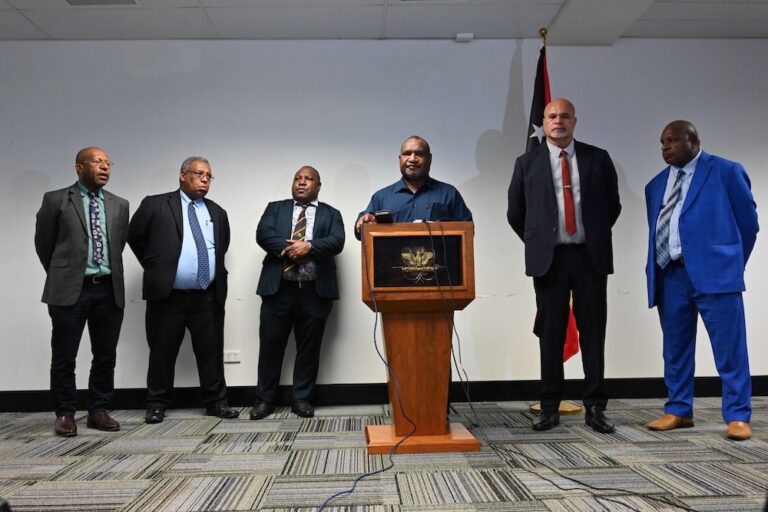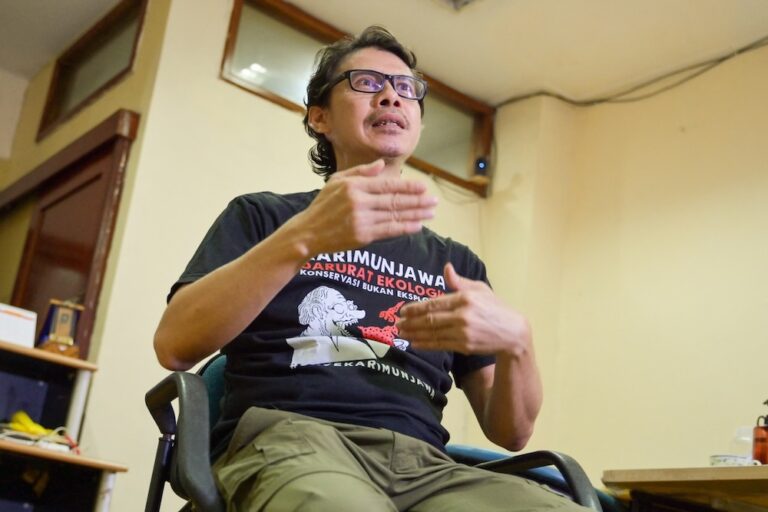July 2024 in Asia-Pacific: A free expression round-up produced by IFEX's regional editor Mong Palatino, based on IFEX member reports and news from the region.
Protests turned deadly in Bangladesh, a list of concrete measures to uphold free speech in India, media killings in Pakistan, and journalists declared a strike in Australia.
Bangladesh: Protests, violent crackdown, information blackout
A court decision reinstating a controversial quota system for public sector jobs sparked protests in various universities in Bangladesh. Pro-government forces attacked the protesters, which led to more violent clashes. As of 24 July, the death toll had climbed to 197 people. Police arrested 3,000 people on vandalism and destruction charges.
To contain the spread of protests, the government ordered the closure of universities on 16 July. It also imposed a complete internet blackout for five days. During this period, the crisis escalated as the government accused the opposition of instigating unrest. Meanwhile, government troops were denounced for reportedly attacking unarmed students. Internet restrictions made it more difficult to stop the spread of disinformation related to the protests.
Around 30 journalists covering the protests were injured while three reporters were killed. State-run media outlets were also attacked. Media groups condemned the violence and called for the protection of journalists. PEN International underscored that during a crisis situation, “journalists play a vital role in promoting accountability and transparency by monitoring and reporting on protests.”
In a special session on 23 July, the country’s top court ruled that 93 percent of future jobs will be based on merit, which essentially reformed the quota system that prioritized the descendants of the country’s freedom fighters. The government also formed a commission to investigate the killing of six students. Student activists vowed to pursue justice and to continue the struggle against discrimination.
Modi gets a third term: A way forward for India
India’s Prime Minister Narendra Modi secured an unprecedented third term, but the reduced share of seats of his party is seen as an opportunity to push for reforms within the coalition government. Civil society groups have outlined several issues that need to be addressed, which would entail a reversal of policies enforced by the Modi government over the past decade.
The International Press Institute (IPI) listed “lawfare” against the press, cybercrime laws as a means of censorship, internet shutdowns, spyware, and impunity for attacks against journalists as among the key concerns that undermine the people’s right to information. IFEX member SFLCin has launched a Free Speech Tracker as a tool to monitor, document, and provide analysis of the same concerns mentioned by IPI.
Reporters Without Borders, along with the Network of Women in Media in India, Free Speech Collective, and Internet Freedom Foundation have provided ten recommendations that the government can adopt to promote free speech in the country.
- Overhaul anti-terrorism laws so they are not used against journalists
- Overhaul laws that are misused to control and censor the media
- Establish an independent commission to investigate cases of spyware targeting journalists
- Protect the confidentiality of journalists’ sources
- Safeguard pluralism by regulating media concentration
- Adopt protocols to protect journalists
- Put a stop to arbitrary internet shutdowns
- Guarantee the foreign media’s ability to cover India
- Hold press conferences
- Protect the rights of all journalists
ARTICLE 19 added the impact of voter suppression and political repression, which led not just to the blocking of protests but also the criminalization of dissent. It urged global civil society to assist Indians and local groups that have been resisting the Modi government’s repressive policies, sharing the following recommendations:
- Provide financial assistance to critical journalists, digital influencers, and human rights activists
- Support diaspora groups who have been exposing human rights violations across the globe
- Use diplomatic channels from countries committed to liberal democracy to pressure the Indian government to safeguard democratic norms
- Lobby for an overhaul of draconian law and surveillance laws
In brief: Trends and updates
Radio and TV closures in Afghanistan. IFEX member the Afghanistan Journalists Center (AFJC) reported that seven TV and radio outlets were forced by Taliban authorities to shut down their operations in the first half of the year. Its report also recorded a total of 89 cases of media freedom violations, which included 60 incidents of threats and 29 media-related arrests. AFJC urged the government to “stop making unwarranted demands on journalists and media organizations and to “establish a climate that is devoid of fear and self-censorship.”
Media killings in Pakistan. Daily Aaj reporter Malik Hassan Zaib was shot dead on 14 July, which brings the number of killed journalists in Pakistan this year to eight. In May alone, four journalists were killed in the country. Media groups have called for greater protection to ensure the safety of journalists. Meanwhile, Kenya’s Hight Court ruled that the killing of Pakistani journalist Arshad Sharif by the Kenyan police in 2022 was unlawful. In response to the court ruling, IFEX member the Pakistan Press Foundation pressed for a comprehensive investigation into the reasons that forced a prominent journalist like Sharif to leave the country.
Journalists on strike in Australia. Journalists at Nine Publishing (The Sydney Morning Herald, The Age, The Australian Financial Review, Brisbane Times and WAtoday) declared a strike from 26 July to 31 July after a breakdown in negotiations on better pay and the looming job cuts announced by the company. IFEX member the Media, Entertainment & Arts Alliance enjoined the public to extend solidarity with the journalists. “Journalists’ working conditions are intrinsically linked to their ability to perform their role of holding power to account. Attacks on journalists is an attack on the public’s right to know the truth.”
South Korea court affirms rights of same-sex couples. South Korea’s Supreme Court issued a landmark ruling directing the National Health Insurance Service to provide dependent benefits to same-sex partners. Human Rights Watch called it a victory for the LGBTQI+ community and urged legislators to follow this up by passing comprehensive anti-discrimination legislation.
Journalists under attack
In Indonesia, media groups are calling for an investigation after Tribrata TV journalist Rico Sempurna Pasaribu and his family perished in a suspicious fire. They suspect that the arson was in retaliation for the journalist’s reporting about an illegal gambling den allegedly owned by an army officer. THe chairperson of IFEX member the Alliance of Independent Journalists, Nany Afrida, said that the incident is a “severe violation of press freedom in Indonesia and sets a dangerous precedent.”
In Myanmar, Development Media Group (DMG) journalist Htet Aung and security staff Soe Win Aung were sentenced to five years in prison with hard labor for the alleged crime of “abetting terrorism.” The verdict reflects the junta’s relentless attacks targeting independent media, especially against DMG which has consistently reported about the military atrocities against the Rohingya minority in Rakhine State.
In Hong Kong, local and global media groups have expressed solidarity with journalist Selina Cheng who was fired from her work at The Wall Street Journal after her election as chair of IFEX member the Hong Kong Journalists Association (HKJA). Media outlets operating in Hong Kong are reminded that they risk “hastening the decline of what space for independent journalism remains” in the city if they pressure their employees not to take an active role in press groups like the HKJA.
In Mongolia, Zarig news editor Unurtsetseg Naran was sentenced to four years and nine months in prison after a court in a closed-door trial convicted her of spreading false information, tax evasion, money laundering, revealing personal secrets, and illegal acquisition of state secrets. Unurtsetseg is known for her investigative reports on local banks, sexual abuse in a Buddhist boarding school, and violence in the military. Galbaatar Lkhagvasuren, a lawyer at IFEX member Globe International Center, told the media about the need to abolish some provisions in the criminal code that are being used to restrict investigative journalism and spread fear and self-censorship among journalists.



